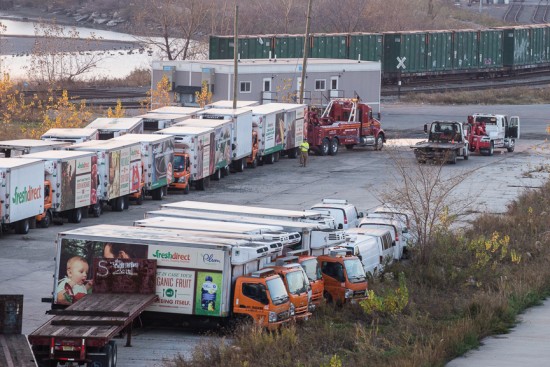Local advocates sound the alarm over the area’s trucking fleets as the need for food delivery services spikes citywide
As the novel Coronavirus continues to grip New York City, concern is growing over whether the high rates of asthma in the South Bronx could make many residents especially vulnerable to Covid-19.
“We have a lot of asthmatics and seniors in the South Bronx, and this is going to hit our community hard,” said Mychal Johnson, a spokesman for South Bronx Unite, an environmental advocacy group located in Mott Haven.
The data on the asthma problem supports Johnson’s claim.
Accounting for nearly three times the citywide rates of child hospitalizations for asthma according to health data from 2018, Mott Haven and Melrose are particularly vulnerable to diseases that attack the upper-respiratory tract, like Covid-19.
The federal Center for Disease Control lists individuals with asthma as being in the highest risk group for having complications after contracting Covid-19, though some medical professionals question the guidance.
“We don’t know how this new virus is affecting patients with asthma,” said Dr. Acklema Mohammad, a Mott Haven pediatrician with Urban Health Plan who also specializes in asthma treatment in the South Bronx. “We don’t know yet because there haven’t been a lot of studies into the new virus,” she said.
Data released daily by the NYC Department of Health is inconclusive. As of April 1, 8,398 residents of the Bronx had contracted Covid-19, and 26% of those individuals had been hospitalized. The borough had suffered 289 Covid-related deaths; 247 of those who died had underlying causes. Underlying causes include asthma, diabetes, lung disease, cancer, heart disease, hypertension, kidney and liver disease. A map tracking cases by zip code shows some areas of Mott Haven and Hunts Point as having fewer cases than elsewhere, but the Longwood area having more.
Mohammad has been strongly advising patients to continue social distancing – maintaining a distance of at least six feet from those whom they do not live with – and making sure patients have enough medicine and are regularly taking their inhaler.
The concern over asthma in the South Bronx goes back well before the outbreak of Covid-19, with activists like Johnson having spent much time trying to fix the air quality in the area.
Touting research from Columbia University by Dr. Markus Hilpert, Johnson believes that companies like FreshDirect, the city’s largest online food delivery company, are directly responsible for the increase in pollution in Mott Haven. The researchers mounted air quality monitors across Port Morris to track black carbon and particulate matter, and have cited increases in those contaminants since the facility opened, which they believe are hurting residents.
FreshDirect moved its headquarters from Queens to Port Morris in 2018, despite fierce criticism from South Bronx residents who argue that exhaust from the company’s thousand delivery trucks per day worsen the neighborhood’s high asthma rates.
The researchers were expected to present their findings to Community Board 1 in April, but board meetings have been postponed because of the virus.

Fending off anger from residents at a community board meeting in Mott Haven in February, Larry Scott Blackmon, vice president of public affairs for FreshDirect, said the company is looking to use electric trucks to reduce emissions, but has run into issues.
“We travel around the world to investigate vehicles that have no emissions,” said Blackmon, but said issues with batteries prevent electric trucks from being a viable option.
Port Morris resident and Board 1 member Cecil Brooks, who learned the results of the Columbia study at a public forum hosted by South Bronx Unite in January, cited the report’s findings of a 12 percent increase in vehicle traffic and noise levels. He told Blackmon that the “livability concerns” raised by the study make it clear that the South Bronx’s “air quality has worsened” as a result of FreshDirect’s trucks.
“I’m not familiar with that study,” said Blackmon, but added “I’m sure it would be the result because of who commissioned the study.”
“We’re getting pollution but we’re not getting groceries,” said Board 1 member Jaliz Albanese. Opponents say that most South Bronx residents can’t afford FreshDirect’s high prices, and complain that the company’s promise to provide its food for locals through benefits has gone unfulfilled. FreshDirect contends that those benefits are determined by federal policies, which shrunk when the Trump administration took office.
Blackmon or Fresh Direct did not return a request for comment for this story.
Regardless of the source, asthma rates in the South Bronx now raise questions of whether area hospitals will have the capacity to continue treating the influx of Covid-19 patients.
In a statement, a spokeswoman for New York City Health + Hospitals, which operates Lincoln Hospital, said they are confident they will be able to treat patients.
Dr. Mohammad is continuing to urge her patients to take common sense steps to prevent getting sick and avoid panicking.
“We have to continue to recommend and promote social distancing, avoiding contact with people with respiratory issues,” Mohammad said. “We should also remind those in the neighborhood that if they live with someone elderly, or someone with immunocompromised illnesses, they should not be too close to them.”
Additional reporting by Joe Hirsch.

